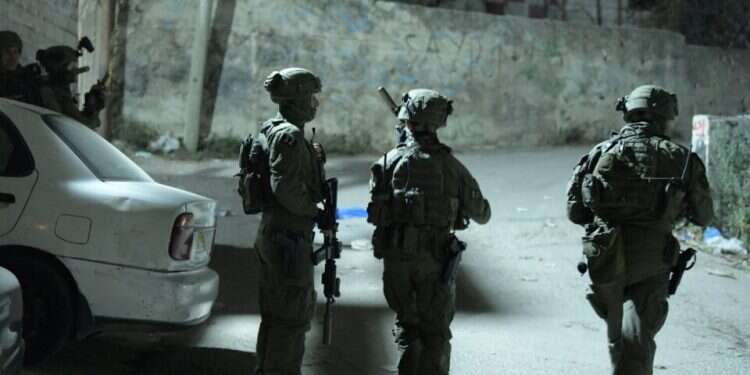At least 10 terrorist attacks in Israel have been prevented in the last two weeks, IDF Chief of Staff Lt. Gen. Aviv Kochavi said Monday evening, speaking at a ceremony honoring the new commander of the Israeli Air Force.
Follow Israel Hayom on Facebook, Twitter, and Instagram
"We will get to every neighborhood, every street, every home or basement in order to get our hands on the terrorists. We will operate everywhere, using every method, to stop the wave of terrorism," Kochavi said.
Kochavi said that IAF strikes were having a "decisive impact" in preventing Iranian forces from entrenching themselves in Syria, keeping Hezbollah out of the southern Golan Heights, and preventing Israel's enemies from "gaining advanced weapons systems," as well as eliminating threats in the form of plans to penetrate Israel and attack its citizens.
The ceremony marked the beginning of the tenure of Maj. Gen. Tomer Bar as head of the IAF. Bar succeeded Maj. Gen. Amikam Norkin, who retired from the military.
Bar said, "We are in a time of regional changes that brings both dangers and opportunities, that required more considered conduct than ever, with an obligation to national security."

Later Monday, security forces arrested eight people amid unrest at Damascus Gate at the Old City of Jerusalem.
The rioting erupted as the heavy contingent of police deployed at the gate were attempting to allow crowds of Muslim worshippers to hold Ramadan prayers at the Temple Mount. Clashes emerged at Damascus Gate, with rioters making inciting against Israel. A small group of rioters shot off fireworks and threw bottles and rocks at the police.
Eight individuals were arrested, some of whom were suspected in the rioting and attacks on police personnel that had taken place on Sunday. The suspects were identified through a combination of outlooks and tips from informers.
The last few days have seen a rise in both the number of security incidents at Damascus Gate and the number of people involved in them.
The Israel Police are also preparing for the one-year anniversary of Operation Guardian of the Walls in May. The 11-day operation against Hamas was marked by unprecedented violence against Jewish residents of Israel's mixed cities, and security forces are concerned about a possible repeat.
"We know that the triggers that existed prior to Guardian of the Walls still exist," head of the police's Operations Department, Israel Police Maj. Gen. Sigal Bar Zvi said Monday.
When asked if the police had any intelligence about what might unfold as the anniversary approached, Bar Zvi said, "It's not certain there will be intelligence if someone decides to light things up." However, she noted that the police were better prepared to deal with unrest in multiple areas than they were in the past.
Meanwhile, since the beginning of 2022, the Israel Police have arrested over 5,000 (5,115) Palestinians residing in Israel illegally. Of these, 1,124 were questioned by police. A total of 234 were jailed and 723 people suspected of housing, transporting, or employing Palestinians without work permits were questioned.
According to data obtained by Israel Hayom, 2,299 of the suspects were arrested in the Jerusalem area, while 996 were arrested in the western Negev, and another 733 were arrested in Judea and Samaria. In the northern district, 333 Palestinian illegal residents were arrested, and another 453 were arrested in the south.
Subscribe to Israel Hayom's daily newsletter and never miss our top stories!
The Border Police are spearheading the operation to detain Palestinians in Israel illegally. A high-ranking officer told Israel Hayom on Monday that "Psychologically and geographically, most of the Palestinians come to Israel to make a living."
One resident of Nablus told Israel Hayom that Palestinians working in Israel illegally are trying to feed their children but cannot afford to pay for a work permit, which costs 2,500 shekels ($779).
A., from Tulkarem, said that some Palestinians were so desperate they were entering Israel through holes in the security barrier: "The costs of work permits originally fell on the employer. To evade them, some employers look for workers who will pay for their own permits."
"Someone who can't afford to pay for a work permit has two options: either look for work in the PA for much lower wages than in Israel, or working in Israel illegally, which could lead to arrest or imprisonment," A. said, adding that in some cases illegal workers were vulnerable to fraud by their employers but were afraid to file complaints lest they be arrested.
"One of the biggest difficulties Palestinian workers in Israel face is the brokers and work permit dealers, who are vampires. Some employers defraud some of the workers, who are afraid, either by using weapons or by [threatening] to inform on them to the police, which forces the worker to go home empty-handed," A. said.
Estimates of the number of Palestinians in Israel illegally range from 40,000 to 80,000.
Anyone suspected of housing, transporting, or employing Palestinians without permits to work in Israel could face serious charges and possibly prison time.
The first time a Palestinian is caught living in Israel illegally, he or she is questioned. Their personal information is recorded, and they are returned to the PA.




